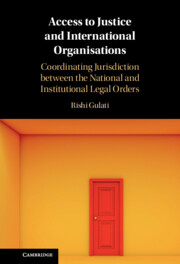 Access to Justice and International Organisations
Access to Justice and International Organisations Published online by Cambridge University Press: 10 March 2022
We live in a ‘denial of justice age when it comes to the individual pursuit of justice against IOs. The victims of the cholera epidemic introduced in Haiti by UN peacekeepers in 2010 are still awaiting justice. They have not yet had an opportunity to access a court to realise their rights. The victims of the Srebrenica genocide for which the UN assumed moral responsibility have not received an effective remedy.
To save this book to your Kindle, first ensure [email protected] is added to your Approved Personal Document E-mail List under your Personal Document Settings on the Manage Your Content and Devices page of your Amazon account. Then enter the ‘name’ part of your Kindle email address below. Find out more about saving to your Kindle.
Note you can select to save to either the @free.kindle.com or @kindle.com variations. ‘@free.kindle.com’ emails are free but can only be saved to your device when it is connected to wi-fi. ‘@kindle.com’ emails can be delivered even when you are not connected to wi-fi, but note that service fees apply.
Find out more about the Kindle Personal Document Service.
To save content items to your account, please confirm that you agree to abide by our usage policies. If this is the first time you use this feature, you will be asked to authorise Cambridge Core to connect with your account. Find out more about saving content to Dropbox.
To save content items to your account, please confirm that you agree to abide by our usage policies. If this is the first time you use this feature, you will be asked to authorise Cambridge Core to connect with your account. Find out more about saving content to Google Drive.